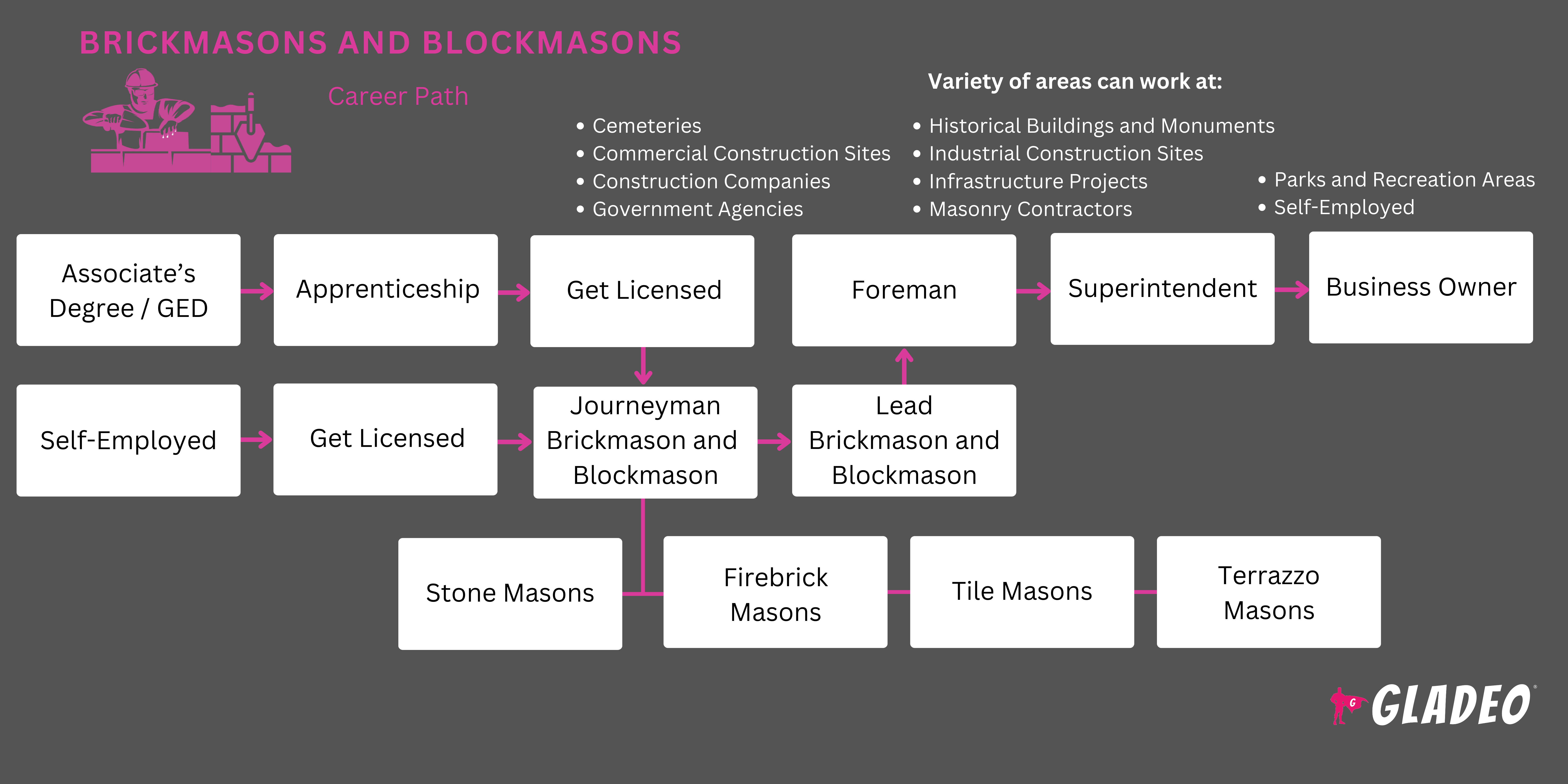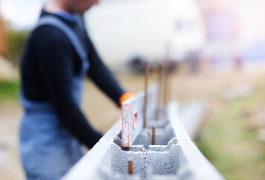Spotlights
Block Layer, Block Mason, Blockmason, Brick and Block Mason, Brick Mason, Bricklayer, Concrete Finisher, Mason, Masonry Installer, Tender
Brickmasons and Blockmasons build walls, fireplaces, and paths using stones, terra cotta, bricks, and concrete blocks. Sometimes they mix and pour concrete for patios, roads, and other flooring. There are a few different areas of specialization, such as brick masonry, stonemasonry, terrazzo work, and cement and concrete finishing. They use specific tools to cut, shape, and repair materials, with many workers spending hours to painstakingly create intricate artistic designs while others simply focus on building a nice, perfectly smooth surface.
- Ensuring structures or surfaces are safe and solid for people to use
- Enhancing the quality and visual aesthetics of local building projects
- Physically creating new things that may last for decades to come
Working Schedule
- Brickmasons and Blockmasons work full-time with overtime potential during tight construction deadlines. They may need to work during non-peak times when there is less foot or vehicle traffic.
Typical Duties
- Review blueprints or illustrations of work to be done
- Determine materials to be purchased
- Measure areas and build out any specific corners and patterns to work within
- Mix mortar or materials and lay foundations; clear any excess material
- Keep work area clear of dust, chips, or other particles
- Shape materials to fit into pattern sizes using various tools
- Lay bricks, tiles, blocks, stones, or other materials
- Fasten or fuse materials together as needed
- Build structural walls and ensure they are level and aligned correctly
- Use caulking materials to fill gaps
Additional Responsibilities
- Examine existing structures or surfaces for damages or flaws
- Perform minor repairs and cleaning
- Polish surfaces as needed
Soft Skills
- Dexterity
- Hand-eye coordination
- Independent
- Normal color vision
- Patience and persistence
- Problem solving
- Safety-oriented
- Stamina
- Time management
- Visualization
Technical Skills
- Construction management programs
- Computer aided design
- General office suite programs
- Project management
- Tools and equipment, such as abrasive stones, wrenches, angle grinder, pulleys, blow torches, bolt cutters, C clamps, caulking guns, chisels, compasses, cutting machines, edgers, grease guns, hammers, hoists, jacks, levels, lifts, mortar mixers, plumb bobs, power chippers, drills, saws, screw guns, steam cleaners, scaffolding, shielded metal arc welding, shoring equipment, spot welding, staple guns, tower cranes, trowels, winches, and more
- Building construction
- Heavy and civil engineering construction
- Masonry/concrete contractors
- Self-employed
Brickmasons and Blockmasons have physically demanding jobs that require lots of lifting, kneeling, and bending. Work conditions are typically outside and can get dusty, wet, or hot depending on weather. The work they do is usually designed to last for a long time, so they’re expected to be very accurate with their calculations and measurements before starting and then make sure the work is done to very high standards.
They’re required to work with patience and attention-to-detail, yet also be able to meet timelines for completion. Some jobs have to be done at odd hours, when people aren’t walking or driving on the work area itself. Another sacrifice involves the risk of injury, in particular cuts or falls. Brickmasons and Blockmasons have to keep an eye out at all times and wear personal protective gear to protect their lives and limbs.
Their job outlook is impacted by broad factors that they cannot control. When the economy is good, construction ramps up and Brickmasons and Blockmasons have more work to do. However, even when construction is slower, there’s usually work for repairs and renovations.
Workers with experience with cement and concrete may have an edge over terrazzo workers who are expected to be in less demand in the coming decade. Prefabricated materials also negatively impact the need for masonry specialists. The Bureau of Labor Statistics predicts that those with construction experience will fare well, but overall the industry is declining a bit.
Brickmasons and Blockmasons love to methodically create new things and don’t mind getting their hands dirty to do it! They might have been interested in working with their hands during childhood, and probably enjoyed spending hours outdoors. They are patient and careful, with plenty of stamina to maintain a high degree of consistency over a long period of time. Such focus could have come from their upbringing or simply from hobbies they developed in their youth, perhaps related to other areas of construction such as woodworking or carpentry. They might also have been interested in arts and crafts, and would take great pride in their finished projects!
- A high school diploma or GED is usually all that’s needed to get started
- Brickmasons and Blockmasons can learn as they work, through 3- to 4-year apprenticeships and On-The-Job training
- Some take vocational training or community college courses beforehand or after starting
- Unions and contractor associations pay for apprenticeships; pre-apprenticeships are also available via the Home Builders Institute or International Masonry Institute
- Self-employed masons generally need a state license; other contract workers may, too, depending on the nature of the project
- According to O*Net, 70% of Brickmasons and Blockmasons start with only a high school diploma; 13% don’t have a diploma and 13% complete some college
- If taking community college or vocational school classes, sign up for classes that offer the most hands-on experience
- Look for any programs that qualify for federal aid Pell Grant funds, if you are filing a FAFSA
- In-person learning is generally better than online classes for most masonry-type classes (but some subjects, like blueprint reading or building codes, can be learned either way)
- Decide what you want to specialize in — brick masonry, cement, concrete finishing, stonemasonry, or terrazzo work
- Doing a part-time job as a construction laborer can help gain relevant work experience
- Take classes such as blueprint reading, drafting, math for measurements, building codes, and, of course, safety practices
- Look for training via Mason Contractors Association of America
- Get practical experience by volunteering with Habitat for Humanity
- Request to meet a few workers who specialize in the area you’re interested in. Ask questions, find out how they got started, and pay attention to what they recommend
- Learn what you can from tutorial videos. Hone your skills at home or ask family friends if they have any projects they want to be guinea pigs for, so you can practice your trade!

- Search for local jobs on Indeed, Monster, Craigslist, and Glassdoor
- Having practical work experience or relevant academic work done will help qualify you
- Consider pre-apprenticeships like the ones offered by Home Builders Institute or International Masonry Institute
- Get certified on First Aid
- If applying for an apprenticeship, you may need to pass an aptitude test and submit a resume, so start your draft version early and add skills as you gain them
- List the tools you know how to use on your application (and learn about them in advance)
- Find applicable sample resumes online, carefully review the wording on job postings, then tailor your resume accordingly
- Learn the terminology of the field, and review real-life mason interview questions
- Master the skills and tools for your current job first
- Work with a sense of timeliness and efficiency, be eager to learn, and demonstrate proficiency in all tasks
- Be precise and take your time to get measurements exactly right, so you don’t have to redo work to fix mistakes
- Ask lots of questions but also show that you can work on your own without supervision
- Complete certifications, such as:
- American Concrete Institute International’s Masonry Field Testing Technician
- International Code Council’s Structural Masonry Special Inspector
- International Masonry Institute’s Supervisor Certification
- Join applicable organizations and be an active team player who cares about their fellow workers and helps them succeed
- Finish your apprenticeship and become a journeyman; discuss advancement opportunities with employers and unions
Websites
- Associated Builders and Contractors, Inc.
- Associated General Contractors of America
- Bricklayers and Allied Craftworkers International Union
- Freemasons
- Home Builders Institute
- International Masonry Institute
- International Union of Bricklayers and Allied Craftworkers
- Mason Contractors Association of America
- National Association of Home Builders
- National Terrazzo and Mosaic Association
- NCCER
- Operative Plasterers’ and Cement Masons’ International Association
Books
- Ultimate Guide: Masonry & Concrete, 3rd edition: Design, Build, Maintain (Creative Homeowner) 60 Projects & Over 1,200 Photos for Concrete, Block, Brick, Stone, Tile, & Stucco, by Editors of Creative Homeowner
- Design and Control of Concrete Mixtures, by S. H. Kosmatka and M. L. Wilson
- Marble-Chip Terrazzo Worker RED-HOT Career Guide, by Red-Hot Careers
Brickmasons and Blockmasons have a relatively uncertain job outlook as things in the industry change and the economy yo-yo’s up and down. If you’re interested in a few alternative careers, we recommend looking at BLS’s related occupations and O*Net Online to learn more about the following jobs:
- Carpenters
- Cement Masons and Concrete Finishers
- Construction Laborers and Helpers
- Drywall Installers, Ceiling Tile Installers, and Tapers
- Flooring Installers and Tile and Marble Setters
- Glaziers
- Insulation Workers
- Ironworkers
- Structural Iron and Steel Workers
Newsfeed

Featured Jobs

Online Courses and Tools

Annual Salary Expectations
New workers start around $48K. Median pay is $59K per year. Highly experienced workers can earn around $74K.






